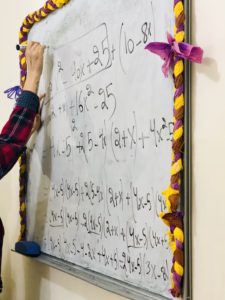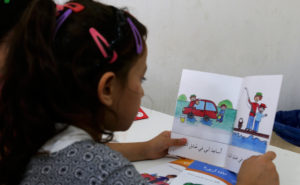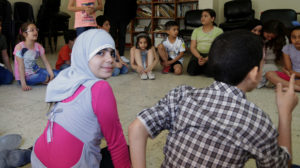
What non-formal education looks like
On a Friday afternoon in Amel Association International’s Haret Hreik Development Center, children aged 7 to 14 are receiving critical non-formal education. 150 students from Beirut’s southern neighbourhoods come from 4 to 7pm three times a week to learn concepts they may have missed at school. They also receive homework support. The difference between formal public education and non-formal education projects is that the latter do not form part of the official and regulated curriculum advanced by the Lebanese Ministry of Education, but are offered by NGOs and other organisations as part of a critical component of a child’s education.
Around 90% of the children who come to Haret Hreik are Syrian. The other 10% are Palestinian or Lebanese and there are a few Sudanese children too. The students here receive much needed reinforcement lessons in English, French and Arabic, and are also offered psycho-social support on a case-by-case basis to address other important issues like trauma, complex family dynamics and societal integration.
Excited voices fill the fourth floor of the centre. The children have just started their lessons. They are grouped together by age even though their educational levels overlap given the lack of resources to create additional Grades. Each classroom has around 20 students per teacher.
Mahmoud A. (12) has been coming to the centre for four years. He enjoys all subjects, though his favourite is English. He is happy here, and dreams of becoming an astronaut one day. “I really like stars!” he tells us. His classmate, Halah K. (11), wants to be a French teacher. “French is my hardest subject, but it is also the one I enjoy the most” she says. Halah has been coming to Amel’s centre for two years and is keen to learn new concepts, in French, on a weekly basis.
When children stop going to school

Afternoon non-formal schooling like that offered at Amel’s Haret Hreik centre is key to maintain school enrollment rates amongst Syrian children. Lebanon hosts close to 500,000 Syrian refugee children and youth between the ages of 3 and 18 but during the 2015-2016 academic year only 42% of them were enrolled in formal public education. By the end of 2017, 200,000 Syrian refugee children were not attending school.
One of the biggest barriers to education for them is language. Accustomed to studying in Arabic in Syria, they find themselves in a position where they must acquire a satisfactory level of English and French to follow a class in mathematics or in biology in either language. Children that are unable to keep up with the Lebanese public education curriculum eventually drop out, often times incentivised by their own parents to do something seemingly more productive that will benefit the entire family.
Many children are forced to work to supplement their family’s income. Child labour in Lebanon is a prevalent concern, and street-based children in particular are the most vulnerable. A UNICEF study in 2016 on the profile of children living and working in Lebanon’s streets found that practically three fourths of them are male, half of them are aged between 10 and 14 and no less than 42% of them are completely illiterate. Three fourths of them are also Syrian.
Young girls who do not receive an education are vulnerable to becoming child brides, and girls who are going to school but then marry are more likely to stop attending. In Lebanon, around 41% of Syrian refugee women that are registered with the UNHCR were married before the age of 18, for marriage is often times the only solution many desperate parents find to meliorate their own financial situation. There is sufficient evidence to show that acquiring an education delays marriage for girls, bringing with it a host of long-term benefits for them and their families.
The Convention on the Rights of the Child binds signatory states to provide accessible education to all children living in the country. Part of the process should involve ensuring children are receiving adequate non-formal education so that language barriers are not a reason they stop going to school.
Education is key to well-being

Keeping up with subjects not only boosts children’s self-esteem and make them feel accomplished, it also motivates them to continue to learn. It also makes parents more reluctant to pull their children out of school.
Furthermore, children who are receiving an education report higher levels of well-being. The children we speak to are very happy at the center – they feel integrated and part of a wider community, taught by their eight dedicated teachers whilst being surrounded by their friends.
“I want to be a dentist because I am fascinated by teeth!” says Mohamed H. (13) smiling. He has been coming to Amel’s Haret Hreik centre for one year and his favourite subject is biology. Read B. (11) has been attending lessons here three years and wants to become the Prime Minister one day. “I want to help my country” he adds.
In Grade 8-9 students are encouraged to tell their classmates, in English, what their goals are for 2019. Three students want to be footballers. A debate arises on whether FC Barcelona or Real Madrid is the better team, but Barcelona ultimately wins. Hala A. (16), who dreams of becoming a famous singer one day, sings Melhem Zein’s ‘Dalle D7ake’ for everyone. It is even better than the original. Though her ambitions lie in entertainment, her favourite subject is mathematics.
Ensemble!
The Amel-run campaign was launched in Spring 2018 to sponsor a number of Syrian children at the Haret Hreik centre and help them continue their education. One donation of 300 euros per year, or 25 euros per month, allows one child to continue their non-formal education at the centre during a full academic year.
Under the slogan #NoLostGeneration the campaign is contributing to ensuring that the future of a whole generation of Syrian children is not lost to war. Unfortunately, donor fatigue is running high. Afternoon homework support and reinforcement lessons that used to be offered by other NGOs in Lebanon have come to a standstill. Ensemble! is one of the few campaigns remaining, becoming a critical actor in maintaining and increasing school enrollment rates amongst Syrian refugees.




 Creative Commons Attribution 4.0 International license
Creative Commons Attribution 4.0 International license